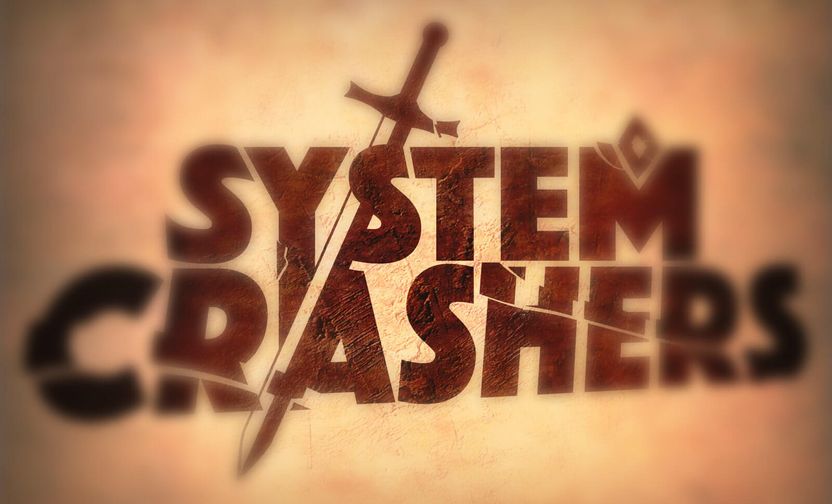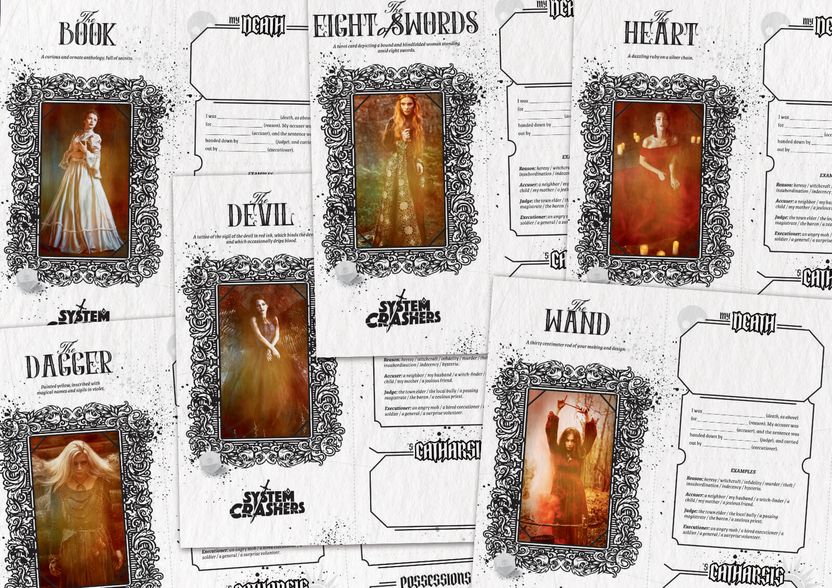A group of women fight back against a fantasy medieval society that systemically wrongs them.
You were murdered in a previous life. Until you reach your personal catharsis, you will not escape the circle of reincarnation. But you possess and have mastered[1] command a powerful instrument, and you have found others like you. Together you rage against the abominable machine.
Content Warning: Due to its very nature, the game inevitably deals with the themes of misogyny, sexism, and ignorance. How deeply your group wishes to engage with these depends on the tone you choose; we provide three suggestions below. It also means that the GM will be portraying characters who embody these themes, but you don’t need to feel too bad for them, since these characters will soon get what’s coming to them.
The game also deals with death, and its myriad horrid medieval fantasy manifestations. Yet its echo both drives and empowers the player characters and guides them towards catharsis.
Work in Progress: This game is a work in progress, and nothing is set in stone. It is currently being playtested.

Tone
Choose one:
- Just for fun. Our trauma is personal—we’re in it for the action and the loot.
- Like a medieval A-Team. You find and help others stuck in systemic injustice.
- Dismantle society. There is no redemption, a clean slate is the only option.
Characters
Your Instrument
Pick a unique occult instrument, then choose one of its powers. You unlock more powers through advancement. When a companion achieves your catharsis, your catharsis power is unlocked.
The Book
A curious and ornate anthology, full of secrets.
- The Book of Names. You know everyone’s true name.
- The Book of Cautionary Tales. You are perceived as the subject of a cautionary tale to people when they meet you for the very first time.
- The Book of Light. You have dominion over existing light.
- The Book of Paranormal Romance. Everyone comes with strings attached. You know the dark secret of romanceable others.
- The Syllabus of the Human Condition. Knows whether another’s ignorance is wilful, and thus hard to change, or nurtured, awaiting only reasoning and proof.
- Catharsis: For any given book, there is an equal chance that you have already read and memorized its contents, or that your book’s index lists relatively precisely where it is.
The Dagger
Painted yellow, inscribed with magical names and sigils in violet.[2]
- Control air in subtle but very precise ways.
- Roll to evacuate air from lungs of touched creature, if applicable.
- Compress air to form strong winds, roll to stop average sized creatures from approaching you.
- Form air into sudden gust, launching you and friends a long distance, or roll to launch group of creatures.
- Break through the glass ceiling. You may bet any number of your death dice to rolls.
- Catharsis: Your
masterymisstery of air is absolute. You may create air where there was none. You may compress air to the point of ignition. You may oblige air to carry unusual artifacts like dreams, colors, poems, or ideas.
The Devil
A tattoo of the sigil of the devil [3] in red ink, which binds the devil to you, and which occasionally drips blood.
- Temporarily convince people that rocks are coins.
- Make a person see you as whomever they want you to be.
- Dance with your sisters in the witching hour and fly on brooms for the rest of the night.
- Fascinate crowds, focusing their attention on you.
- Transform into a man for a few hours, and have doors open to you, but mask your insecurities with unfounded bravado.
- Catharsis: Let the devil out to play in a person you touch for a while intimately. He may 1) curse, 2) disease, 3) corrupt, 4) bargain with, or 5) pleasure them, or 6) send them to hell.
The Eight of Swords
A tarot card depicting a bound and blindfolded woman standing amid eight swords.
- Ignore 1 combat difficulty die.
- Summon any perceived blade to you; roll if it is held.
- Sing to your blade to make it fly and spin at will.
- Embody the Eight. Become bound and blindfolded and surrounded by eight sharp swords. Rope, blindfold, and swords evaporate the next morning.
- Manifest another’s current fear into a deadly blade. Once they use it, both disappear.
- Catharsis: You may cut off any damaged limb, extremity, or head from a willing patient with your blade, and a new healthy one will grow in its place within a few days. Erase relevant conditions.
The Heart
A dazzling ruby on a silver chain.
- You are extremely lovable.
- Roll to make a person’s heart skip a beat. They’re suddenly very surprised, excited, or nervous.
- Morality is a scale, and for any given person you know how to stretch it in either direction.
- Roll to make two creatures’ hearts stop: one that you choose, and one that the GM chooses that you can’t see right now.
- Kiss another, and gift them a dream that will open their eyes to their prejudices.
- Catharsis: Kiss thyself or another and gift them a second heart in a physical location of their choosing (within or beyond their body). Unless both stop, the person cannot truly die, recuperating from the loss of one back to full health within a few days (and erasing relevant conditions). At your discretion, it could be a dark heart.
The Wand
A thirty centimeter rod of your making and design.
- Advance or rewind any object or plant along its expected timeline. Roll if it is equipped or if your action is likely to cause harm.
- Make a person experience a startling déja-vu.
- Make an unattended object disappear in a puff of smoke.
- Time is an illusion. Make a person do something much faster or slower than usual, roll if they’re unwilling.
- Draw greed and lust of power from another by shaping it into a greasy, black goblin that attacks immediately and is as powerful as the drives it represents.
- Catharsis: Carefully trace a door on a solid surface with your wand, and open a temporary portal to anywhere you know. Else rush it, and all who pass will emerge with the “skin and clothes torn and ripped” condition. Roll if it is a metaphysical destination.
Your Death
You were murdered or lynched in a horrible way. Draw or roll a death. Choose three words that represent insights or teachings from this death. These become your death dice, and you may bet a single one on a roll, provided you can explain how the word it represents helps.
Your death started a loop of reincarnations, where, more often than not, you relive it. You know you can only escape this endless cycle by achieving your personal catharsis, but its nature is known to one of your companions, and it is up to them to realize it for you.
Fill in the relevant details of your death using the suggestions provided, or make up your own:
I was _____ (death: see below) for _____ (reason). My accuser was _____ (accuser), and the sentence was handed down by _____ (judge), and carried out by _____ (executioner).
Deaths
- Hanged. Rope, Dangle, Air, Wait, Drop, Heavy.
- Beheaded. Sharp, Speed, Eyes, Sword, Block, Wood.
- Burnt at the stake. Fire, Spectacle, Screams, Chains, Curse, Sorcery.
- Crucified. Pain, Exhibition, Endurance, Solitude, Iron, Air.
- Chased off a cliff by angry mob. Falling, Fear, Running, Desperate, Heights, Mob.
- Stoned to death. Anger, Crowd, Slow, Throwing, Stone, Pleading.
- Impaled. Spear, Battle, Blood, Puppet, Fear, Stuck.
- Flayed. Anguish, Muscle, Bleeding, Sharp, Time, Tied.
- Drowned. Water, Breath, Calm, Rope, Cage, Weight.
- Beaten by lynch mob. Wrath, Weak, Accusation, Mania, Clubs, Long.
- Committed to asylum. Patience, Prison, Derangement, Routine, Powerless, Hysteria.
- Stabbed on sacrificial altar. Sacrifice, Immobilized, Dagger, Blood, Cold.
Details
Reason: heresy / witchcraft / infidelity / murder / theft / insubordination / indecency / hysteria.
Accuser: a neighbor / my husband / a witch-finder / a child / my mother / a jealous friend.
Judge: the town elder / the local loudmouth / a passing magistrate / the baron / a zealous priest.
Executioner: an angry mob / a hired executioner / a soldier / a general / a surprise volunteer.
The Catharsis
Draw or roll a catharsis and pick another companion at random, such that every player has the catharsis of another. This catharsis, once completed, will release this companion from the endless cycle of reliving their death, and grant them their catharsis power.
In the event that your character dies fulfilling the catharsis, rejoin the party as a new Instrument, with the number of previously unlocked powers plus one. The catharsis that applied to your previous character now applies to this one.
Each catharsis has a number of steps that need to be completed in a logical order.
Catharses
- Die their death.
- Learn of their death.
- Die in the same way.
- Forgive those who wronged them.
- Learn of their death.
- Find the identity of the accuser.
- Find the identity of the judge.
- Convince your companion to forgive them.
- Let it be known that the accuser and judge are forgiven.
- Avenge their death.
- Learn of their death.
- Find the identity of the accuser.
- Find the identity of the judge or the executioner.
- Kill both of them. In the likely event that they are long dead, kill two equally vile people in similar positions.
- Exonerate them.
- Learn of their death.
- Find records or stories about the event.
- Disprove the accusation. In the likely event that it happened in ages past, place the proof in an official location and spread the word.
- Rewrite their history.
- Learn of their death.
- Find records or stories about the event.
- Replace or rewrite those records, correct a relevant, influential story-teller.
- Help them escape to hell.
- Locate a means to enter hell alive.
- Devise a way to hide there, or strike a bargain with one of the ruling denizens there, or, as a last resort, convince your companion to accept the torment there in lieu of the endless cycle. At least until you can come up with a better plan.
- Preempt their death.
- Learn of their death, so you may devise a different one.
- Convince your companion to die young at your hand, denying fate, thus breaking the cycle.
- Change their identity.
- Find a way to permanently and significantly alter their appearance, or identity in the eyes of history.
- Black magic.
- Discover occult literature.
- Acquire a suitable victim.
- Perform a blood rite where you sacrifice the victim and placate the fates.
- Celebrate them.
- Devise a momentous bacchanalian revelry.
- Make it all about them.
- Celebrate until dawn.
Your Belongings
You are of humble origin, and have few possessions. This is the lack of silver spoon in your mouth at birth. You have an outfit, your instrument, and any two reasonable items of your choice. A modest pouch of silver coins, for example.

Mechanics
When a challenge has an uncertain and meaningful outcome, the GM may ask you to roll. Any such roll is an abstraction for the whole challenge (this is most visible when the challenge is a fight). You roll one or more d12s, and take the best as your result. If the challenge is particularly difficult, it might subtract one or more dice.
- Start with 1d12
- Bet an appropriate d12 death die, if you wish—it may become spent
- This is the glass ceiling
- You companions may help you break through it, by betting an appropriate d12 death die each, if they wish, and increase your chances, at the risk of sharing any conditions resulting from the roll, and potentially having to mark the die as spent
- Subtract a number of dice if the challenge is particularly difficult (the GM will inform you of this; a difficulty 1 challenge, for example, subtracts one die)
- Subtract a die for each condition you currently have
- If none are left, the challenge is impossible to overcome
- Take the best result
- 1–4: Setback. All death dice bet in the roll are spent. You cannot try again, you have to circumvent or flee the challenge, and take a condition. The challenge, or enemy, dictates the condition.
- In combat: You are defeated, take a condition.
- 5–8: Effort. All death dice used in the roll are spent. You may retry, if relevant.
- In combat: Stale-mate. Take a condition, and flee or fight again.
- 9–12: Success. Additionally, recharge one spent death die, either one of yours or one of a character that participated in the roll.
- In combat: You are victorious, the enemy flees, submits, or dies.
Conditions and Recovery
Conditions are inflicted by failed challenges, and each challenge, monster, or enemy comes with its own list of conditions it might inflict. They may be physical, mental, or other.
- Each condition subtracts a die from all rolls.
- Soon this means you need to stick together to overcome challenges.
- Conditions require appropriate, sensible treatment and time to remove.
Spent death dice recover in one of two ways:
- A success on a challenge roll recover any one dice for one character who participated.
- A good night’s sleep restore’s one spent death die.
More about Challenges
The roll is an abstraction for a whole scene. Thus you generally have only one roll per character per challenge or fight, less if some of the characters help others by providing dice.
- The GM describes the intent and likely actions, outcomes, and conditions. The in-game explanation for this is slight prescience on the part of the characters due to their reincarnations.
- E.g. Minotaur breaks through the door, will smash beams, gore, and throw folks about
- The players describe the general type of actions their characters will take, including helping someone else by offering them a death die.
- E.g. Distract to allow Eight of Swords to shine, run and hide, use fire from chandeliers with Rope death dice.
- All player characters involved in the scene roll, even those who are trying to stay out of it, if that in itself is not a given.
- E.g. Trying to flee or hide from an opponent requires a roll too. Being far away from the challenge does not.
Advancement
The first time you take a condition in a session, you gain an advancement, and may pick a new instrument power. Learning from pain, has ever been an early lesson.
Downloads

FAQ
Where is the starter adventure? What am I supposed to do with this without a starter adventure?!
A 4–5 session starter adventure is coming soon now available, and will be is equally free. It's being playtested right now! Check it out here!

Will this game and adventure become available as a printed book and/or PDF?
Yes, no, maybe, probably, we'll see. But I don't have any timescale on this, as we're concentrating on finishing the Fantastology at the moment.
What inspired this?
This came from an awesome game of Good Society I played with Jana, who's also playtesting this. I love how Good Society characters are made up of sheets that fit together and how they have a randomly picked, secret desire. Combined this made for really fun and surprising characters that I would not have otherwise chosen. Also, it was fun playing a scoundrel because it was foisted on me, so it was totally not my fault.
System Crashers is my version of emergent characters. So far it's a lot of fun.
What do I do with the "Embody the Eight" Power?
You might consider it a fancy "summon a bunch of swords and rope" spell. But that's just a starting point: go wild with your ideas.
